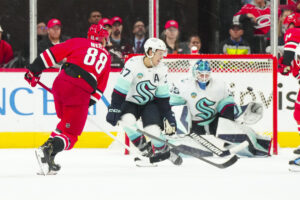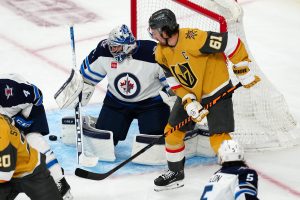The San Jose Sharks ended an ‘all-in’ season in the Western Conference Final, six wins short of the Stanley Cup. We begin our multi-part series by reviewing the 2018-19 Sharks season. Over the course of this series, we’ll look at the team, the players, the coach and management. This will set the stage for a look at the changes the team has undergone. Come next month, we’ll look into the upcoming season.
2018-19 Sharks Season
One Season Focus
The 2018-19 Sharks rolled out the most talented roster in franchise history after acquiring Erik Karlsson. The Sharks parted with draft choices, prospects and younger players in lesser roles. They traded ‘future’ for this season. This was not a team that was building towards something; this team was built for this one season.
At the end of the season, it was difficult not to peer into the future and realize this may be the last serious Cup contender the Sharks will have for a while. Did this generation of Sharks history end without a Cup? It sure feels that way. Especially with the hollowing out of the roster which occurred in and around free agency. The departed include team captain Joe Pavelski, starting forwards Gustav Nyquist, Joonas Donskoi and via trade, defenseman Justin Braun.
While other seasons have ended with hope for the future, this ending felt more like a funeral for what was. If Sharks fans are taking this season’s end harder than those of past seasons, it is for good reason.
The Early Sharks Season
The 2018-19 Sharks season started slowly as the combination of a leaky defence and mediocre goaltending was partially offset by an enormous Sharks offensive output. An early December loss to the Ottawa Senators seemingly left coach Peter DeBoer near the proverbial chopping block.
General manager Doug Wilson then inserted himself into team meetings in Montreal. The Sharks won the next game and then took off. Karlsson, after a slow start adjusting to his new team, found his game and played MVP-caliber hockey. For a quarter of the season, the Sharks were a hot knife through butter, posting a scorching 16-3-2 mark.
A brief drop-off before the All-Star break coincided with the turning point of the season. Erik Karlsson injured his groin a few games prior to the All-Star break and he wouldn’t return to good health the rest of the year. He’d miss all but a handful of games over the rest of regular season.
The Second Half
Following the All-Star Game, the Sharks returned to winning. With the long layoff, a refreshed Martin Jones played his best hockey of the regular season well into February. In late February, the Sharks once again traded ‘future’ for this season, acquiring Nyquist from the Detroit Red Wings for draft picks.
By March, the Sharks had overcome their slow start and were contending for the best record in the Western Conference with the Calgary Flames. However, for the second time in three seasons, the Sharks hit a mid-March swoon, this time losing nine of 10 games.
Still, the surge which began in early December and lasted into March proved enough to put the team comfortably into the playoffs. The team ended the regular season with the second-best record in the Western Conference, behind only Calgary.
A Different Team
The Sharks were, for a change, among the league’s top-scoring teams. The scoring was impressive in its breadth. The team had four players reach thirty goals. The Sharks also had the league’s top point-getting defenseman. Double-digit players reached double-digit goals. With all this offence, the Sharks did not lose a game where they allowed two or fewer goals until their 100th game of the season.
On the opposite side, the Sharks gave up goals in quantity. The goalie tandem posted a league-worst save percentage. While the Sharks improved on their leaky defence over the course of the season, their netminding remained inconsistent and often problematic.
There were four keys to the team’s overall success: stop odd-man rushes, get solid goaltending, dominate the power play and play behind the net with their elite power forwards. When they did these things, the team thrived. When they didn’t, the results were sometimes mixed and sometimes bad.
Sharks Season Highlights
No one provided more milestones than Joe Thornton. He set one meaningful mark after another. Perhaps nothing covers it better than the hockey royalty he passed on the all-time assist list: Marcel Dionne, Mario Lemieux, Gordie Howe and Steve Yzerman.
Brent Burns was a Norris Trophy finalist (finishing second), leading all NHL defensemen in scoring while also crossing the 1,000 game milestone for his career.
There were a few breakout seasons. Kevin Labanc totalled 56 points while Timo Meier and Tomas Hertl both reached the 30 goal mark for their first time. Marcus Sorensen had scored six goals in his prior two NHL seasons but delivered 17 this season.
The Sharks Playoff Run
The 2018-19 Sharks season saw them enter the playoffs with substantial questions. A mediocre finish, the questionable health of Karlsson and league-worst netminding left the Sharks looking vulnerable against a vastly improved Vegas Golden Knights roster. Following a series-opening win, the Sharks lost three straight and were on the ropes. It wasn’t just that they lost, the team wasn’t competitive and goalie Martin Jones was abysmal.
But a stunning turnaround occurred, especially with Jones, and the Sharks managed to even the series. Jones went from allowing in over 20 percent of the shots taken in Games 2-4, to allowing in under two percent in Game 6, stopping 58 of 59 and setting franchise records in the process. It all set up Game 7 at the Shark Tank. It was epic, among the best games in NHL history, with the Sharks winning in overtime.
The Sharks left the first-round series victorious, but the battle of attrition left a whole bunch of marks. The Sharks were battered from an outrageously physical series which saw top players Pavelski, Logan Couture and Marc-Edouard Vlasic among the wounded, some wounded more than once.
Second Round
The next round featured a match with the young and speedy Colorado Avalanche. In a series where the teams alternated wins, the Sharks came out victorious in Game 7 after catching multiple breaks in the series finale.
The Western Conference Final saw the Sharks run into another very physical team, the St. Louis Blues. The Sharks won two of the first three before the Blues defence and goaltending took charge. In the final three games, the high-scoring Sharks scored just two goals and lost the series 4-2.
The Blues won with the formula the Sharks had used most seasons until this one, defence and goaltending. They were highly disruptive to the Sharks attack with excellent stick work, an aggressive forecheck, contributions from across the line-up and superior netminding. The Blues were the bigger team and often looked like the faster team, too.
The End
By the end of the playoffs, the Sharks were beaten up. Hertl and Pavelski both missed a significant part of Game 5 due to hits they took. Neither was able to return for Game 6. Erik Karlsson’s groin gave out in Game 5 and he too missed much of that game and the series finale. Players such as Evander Kane and Meier looked like they were dealing with meaningful injuries. But alas, they wouldn’t say.
Ultimately, a healthy Karlsson and the Sharks ‘all-in’ season may turn out differently. He is that good when right. He wasn’t close to right in the playoffs.
The Season Disappoints
The problem with an ‘all-in’ season is that it can get derailed in many ways. We saw a Sharks team which was the best team in the NHL. Alas, this came in December and January, not April and May. We saw a mentally strong team find ways to win in the playoffs until injuries took an excessive toll.
The Sharks took their ‘all-in’ shot and it didn’t work out. For salary cap reasons, the elite roster was always going to be unsustainable. The early weeks of the offseason quickly confirmed this, with several key players leaving the team. With Thornton nearing the end of his career, this was likely his best shot at a Stanley Cup. His career status coupled with the ‘all-in’ nature of the season and the elite roster makes the 2018-19 Sharks season the most bittersweet in team history.
Main Photo:






